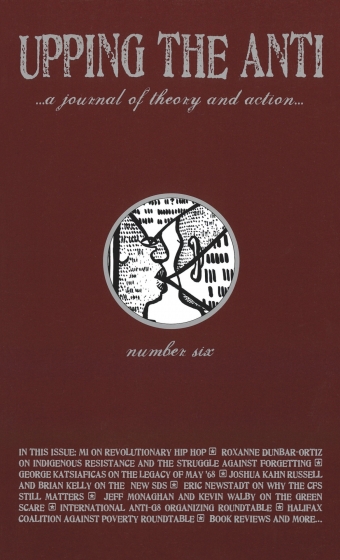Comments on the Three Way Fight
Dear Editors,
Once again, Upping the Anti has done a great job of producing reflections and theory relevant to activism. Thanks for the exchange on the Three Way Fight debate. The two main anti-war coalitions in the US were hurt by their divergent, one-sided approaches on these difficult issues, and much of the rest of the left has responded by not discussing them at all. But we can’t build a successful anti-war movement if we accept imperialism’s blanket condemnations that make those forces the main enemy and discredit all resistance. Nor can we pretend the situation in Iraq is simply a reprise of Vietnam, which had a unified National Liberation Front with deep popular support and a progressive program. So I found the debate very valuable even without fully agreeing with the framework of either side.
Rami El-Amine made a couple of good point when he highlighted Michael Staudenmaier’s sloppy use of the term ?“fascism” and his failure to delve into differences among organizations who uphold Islam. In my opinion, fascism arose in ?and applies to advanced capitalist countries that resort to racist ?mass mobilizations to overcome barriers to their need for militarism and imperial expansion. For me then, it’s usually not a useful term for right-wing movements in the Third World, but “reactionary” does apply to some. Forces based in nostalgia for an earlier, tributary, and more explicitly patriarchal form of society have always been in play; they’ve become much more prominent today because of imperialism’s dual motion of dealing severe defeats to progressive national liberation movements while simultaneously expanding the damage to lives and livelihoods of people in the Third World. El-Amine’s valid stress on the different histories, bases, and programs among groups labeled “Islamist” isn’t adequate because he doesn’t (at least here) delve into which groups might be reactionary and why. And even when a religious party has a tolerant platform while out of power, they can become very repressive once in control (which sadly is also true of many left parties).
We have to be loud and clear in upholding peoples’ rights to resist imperial intervention. At the same time, we need to recognize that there are many forms and forces at play. While I’m painfully aware of the sordid history of Western arrogance in rating Third World groups, we still need to have some level of political analysis. Morally, we can’t implicitly condone groups that slaughter civilians and/or promote sectarian warfare; politically, we can’t implicitly endorse reactionary social programs; practically, we can’t pretend that violence and divisions will end the minute the US withdraws from Iraq. (The weakness of the left and its fragmentation has resulted in part from decades of US intervention – all the more reason to insist on “out now.”)
With sexism, the pre-capitalist forms may seem the most blatant to us in the West – but we often aren’t nearly well enough attuned to the deep and pervasive oppression of women in our own society, let alone to how imperialism is the greatest destroyer of women’s lives and liberation worldwide. Furthermore, the West’s use of women’s rights as a rationale for attacking Third World nations works to discredit feminism there. These issues underscore the value of your excellent interview with Sunera Thobani and her insistence on the need for feminist/anti-imperialist unity.
The dilemma of upholding resistance without endorsing reaction is not intractable, and imperialism’s own strategies are instructive. Many of the right wing forces fighting the West today were fostered by the CIA and the Mossad (Israeli intelligence) as competition for progressive national liberation movements, which were uniting the oppressed across religious lines. Even the more recent turn against the West is not simply a negative blowback. As Samir Amin points out (“Political Islam in the Service of Imperialism,” Monthly Review, December, 2007) oppositions that agree to define the struggle on a religious or cultural basis aid imperialism.
We can’t use terms such as “Islamo-fascism” that echo imperialism’s excuses for aggression. Even the term “Islamic extremism” is biased because, as my friend Walidah Imarisha pointed out to me, each and every religion in the world has been used as a justification by various right-wing forces. Reactionary anti-imperialist groups (whether they invoke Islam or any other religious, ethnic or cultural rationale) are real. But they are neither a co-equal problem to imperialism (as the Three Way Fight perspective might imply) nor a thoroughgoing anti-imperialist force (as an undifferentiated “support the resistance” slogan might suggest). Imperialism’s history of fostering such movements is one more reason why it’s so important to advance on our core struggle: against imperialism.
The point for us then is to be fully and deeply anti-imperialist. That requires our staunch opposition to the exploitation and oppression imposed by the dominant powers and also that we stand with the oppressed. The latter doesn’t mean we pick their leadership, but it does entail having broad criteria for programs that articulate the needs and aspirations of the popular classes, women, and minorities and that include a challenge to global capital’s economic stranglehold.
Here’s a quick little note on the issue that came up about anti-Semitism (in the sense of anti-Jewish prejudice). It’s far from the main problem on the North American left, which is still sadly lacking in making solidarity with Palestinian national liberation, including the right of return and the release of all political prisoners, a frontline issue. But, as with every reactionary current in society, the left isn’t free of anti-Semitism. In my work on AIDS conspiracy theories, I was struck by the ways the far right has infiltrated the left and oppressed peoples’ discourses, using our natural distrust of the establishment to divert us from class analysis and toward narrow conspiracies based on anti-Semitism and homophobia – at great cost to our health and critical thinking.
Solidarity,
David Gilbert
Clinton Correctional Facility
New York State, USA

